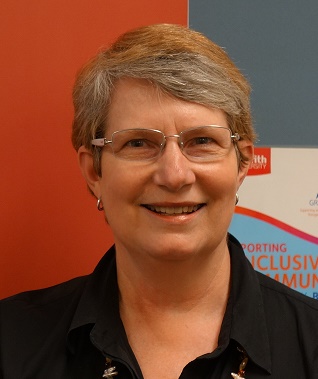Disability Practitioner in the Spotlight
Judy Hartley

Progress through other’s perspectives
With an impressive track record of 40 years in education, spanning primary/secondary and special education, VET and university Judy understands the value of different perspectives in achieving good educational outcomes for students with disability.
Having parents who were strongly influenced by social justice principles because of their life experiences, meant that Judy was actively connected with people with disability and developed an understanding of the challenges they faced in the community from an early age. She also understood the importance of quality education in the lives of people with disability and has always been motivated by the principles that everyone has value, and everyone can make a difference. As well as the motto: ‘whatever you do – do it well- not half-heartedly’. Consequently, she started her career as a specialist teacher of the Deaf and is now currently the Manager of Student Equity Services at Griffith University. A role she has been in for thirteen years.
Through this time Judy has observed the educational approach change from a ‘remedial’ one based on a medical deficit model to a much more rights based and ecological model, “It has shifted from an approach where we said we will do this for you, to one where we look at ways to make the whole system accessible for everyone including physical environment, information and technology access, curriculum and policies”. An inspiration for her in this approach is the story of Martha’s Vineyards in the USA where many families included relatives who were Deaf. Everyone in this community, Deaf and hearing, used sign language and hence no one was isolated or excluded due to language barriers. In a small way these days, some of the new university campuses are well designed for accessibility, so that people with physical disabilities don’t have to seek accommodations to access these environments.
However Judy knows that there is much more work to be done and while some progress has been made, education is nowhere near to being inclusive yet. There are still significant issues to be tackled and are being tackled by people every day. It is about continuing to strive for an end point, and having systems, supports and services that are always evolving. And to remember that responses and solutions always evolve in context. Whilst it is important to share practices and approaches, solutions can’t always transfer exactly from one institution to the next, or even from one campus to the next.
However, sharing of practices is very important for the sector. Judy has attended 10 out of 12 Pathways Conferences and know they are vital for sharing and working with others. “And together with the Austed email list and ADCET, the Conferences are a great way to bring together a national community of practice”.
Also the collaboration within student services teams, and between disability services staff and other staff adds to finding effective solutions. “It’s not then about only one person solving a problem, collaboration means that we can look at issues from different perspectives”. Judy therefore regards the Disability Practitioner role as a complex role that requires skilled communication with a range of stakeholders. One that requires both creativity and practical skills.
“It’s great to see people new to the role bring new energies, new perspectives as well as a willingness to learn”. Judy’s advice to new practitioners is to listen and learn from everyone, and be open to their diverse backgrounds and perspectives as they all add to the mix of experience. And to those experienced practitioners her advice is to remain open to change and perspectives, as well as use your experience to mentor others, either new staff or students.
Mentoring others to develop leadership skills is important for the sector’s continuity and growth.
Judy loves seeing students successfully take on leadership roles whilst at university. She encourages students to participate in every way possible, including being mentors to other uni students, and to go out and be mentors to school students. This can be a great way for students to pass on study tips to others with or without disability. As a young teacher, Judy was mentored by some amazing teachers, and knows how valuable this experience can be.
One of the lessons she learnt from her mentoring was the importance of taking a positive stand on important issues. “Sometimes this can be hard, and if I’m not being effective in my actions I have to think again how can I change what’s going on”.
When frustrating times occur in the job, Judy stops and takes a deep breath (or two) and reminds herself to keep sight of the big picture. That though there is still much to be done, often you make a difference by the little things that you do. And sometimes the little things, can unveil significant issues that lead to substantial change.
So Judy sees the key to her work as keeping a balance between being passionate about what she does, and knowing that you can’t do everything overnight. And to collaborate with others wherever possible, so that good relationships are forged based on trust and understanding and respect for others perspectives.
And reflective of the strong social justice ethos that was passed down to her from early years she hopes that she has passed to others, both colleagues and family, a commitment to always act fairly with empathy in whatever one does.

